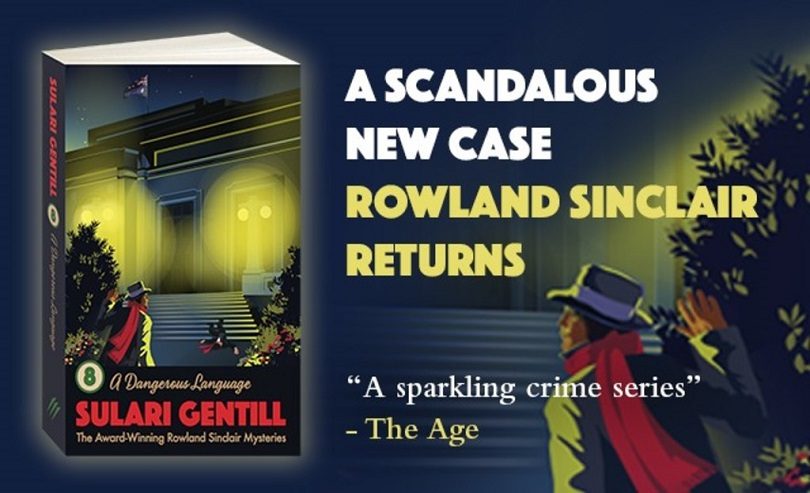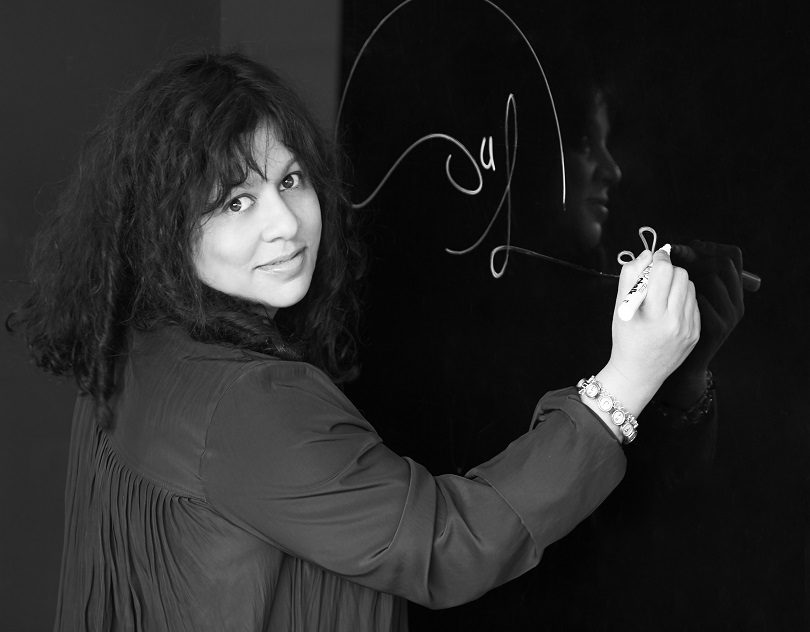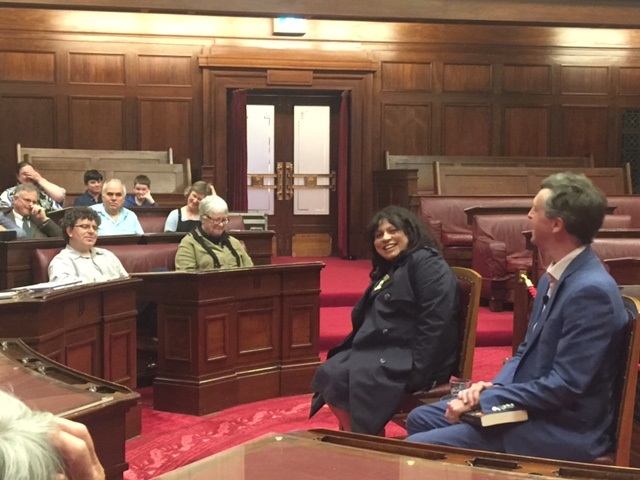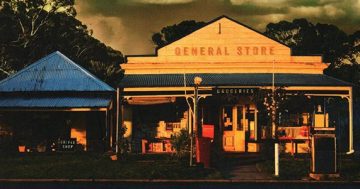
The RiotACT joined other crime fiction fans at the Museum of Australian Democracy (MoAD) at Old Parliament House this week for the launch of Sulari Gentill’s novel A Dangerous Language, the latest in her award-winning Rowland Sinclair Mysteries series. Sulari spoke about her work at the recent Canberra Writers Festival and was ‘Writer In Residence’ at the Museum in 2015, where she was able to do her research for the novel. It comes as no surprise then that the plot of A Dangerous Language is connected to Old Parliament House in Canberra.
MoAD hosted the book launch in the Senate Chamber at Old Parliament House. during which the author of the award-winning Rowland Sinclair mysteries was interviewed by former NSW Minister Graham West (who is the Australian National President of the St Vincent de Paul Society and, as it turns out, a major crime fiction fan!). His clever questions revealed much about this amazing author’s journey as she researched and wrote this novel, including her hilarious description of the answers that MoAD staff gave her when she asked them “where in this building could you murder a man and get away with it?”
I will also never forget her explanation that “a good book is like a beautiful dance between two people. The author leads, but the reader needs to dance as well”. She elaborated how novels lose an element of literary joy when they become TV series, and the ability of the reader to imagine the characters, and what they look and sound like, is diminished.
It was very appropriate that MoAD hosted this book launch as the murder of a Communist agent depicted in the novel occurs on the steps of Old Parliament House, drawing our hero Rowland Sinclair into the dangerous world of politics and assassination.

Sulari Gentill has a long association with Canberra since she first enrolled to study astrophysics at the ANU. She switched to law, and eventually left law to write full time, but still talks about the beautiful night sky of the capital region. She has since settled at the foothills of the Snowy Mountains to raise her family and write professionally. Sulari is also the author of the acclaimed commercial literary fiction title, Crossing the Lines, as well as the Greek mythological adventure series, The Hero Trilogy.
Sulari explained that all good historical fiction is built on the clever adaptation of real-life events and she described how she was inspired by the real-life visit of the famously controversial Jewish international peace advocate Egon Kisch to Australia in 1935. In her book, Rowland Sinclair volunteers his services as a pilot to Egon, and is embroiled in the political storm surrounding the conservative Australian Government’s attempt to keep Kisch off Australian soil.
The historical fight against the rise of right-wing politics and fascism presents a timely lesson with relevance to modern politics. During the discussion, Sulari explained that her research for the novel found many frightening parallels between western society in 1930s Australia and the modern rise of right-wing populism, nationalism and fascism across the world since the Global Financial Crisis. She explores the post-Depression rise of the fascist New Guard in Australia and its influence on the conservative Lyons Government at the time. One can’t help but reflect on how Pauline Hanson’s One Nation and the right wing of the LNP is also influencing the current Federal Government, or how the so-called Alt-Right supports and influences Trump and the US Republicans.

Sulari Gentill: the author behind the award-winning crime series.
Sulari’s historical perspectives are enlightening and the political insights within her novels are sharp and clear. Questioned about the New Guard by Graham West, Sulari explains that at its height the New Guard had over 40,000 members, armed and ready for revolution. They didn’t revolt, as their arch-enemy NSW Labor Premier Jack Lang, was sacked during Australia’s first example of an elected parliamentary leader being dismissed by a regal representative. This was in contrast to the arch-enemies of European fascists, who remained to be depicted and used to motivate the extremism and growth of the hard right. Who knows what would have eventuated in Australia had Lang not been dismissed? The New Guard had also planned to kidnap Lang, and plotted a coup against him during the crisis that brought Lang’s premiership to an end.
Delighted to spend the afternoon in the Senate Chamber with @SulariGentill for the launch of her novel, A Dangerous Language! @PanteraPress pic.twitter.com/Yd9zipZ3rB
— MuseumofAusDemocracy (@MoAD_Canberra) October 5, 2017
Many of Graham West’s questions to Sulari revolved around her early days of writing and how she quickly evolved into such a prolific and well-regarded author. She humbly explained that she loves creating characters and stories and hopes she can continue to share and enjoy this with her devoted readers. Graham also asked about the characters in this book, how they evolved and their reactions to the events of the world swirling around them. Sulari explained her research (with some help from her historian husband) revealed from the newspaper, letters, pages, and other accounts that many Australians were well aware of the rising pall of fascism from the Great Depression. She saw many parallels with today’s rising inequality, fracturing societies and the rise of personality politics and demagogues. She explained how in real life history the Australian fascist Eric Campbell – the New Guard’s most famous leader and a recurring villain in her series – travelled to Europe to visit and admire fascists in Italy and Germany.

Gentill, West, and the audience at the Old Parliament House.
Another startling reminder of how much Australia has recently changed was the description of how the White Australia Policy was used to selectively arrest, reject and expel foreign political opponents. In real life, Egon Kisch was fluent in 11 European languages but was still required to sit a notorious language test under the Immigration Restriction Act. The Act provided that “Any person who when asked to do so by an officer fails to write out at dictation and sign in the presence of the officer a passage of fifty words in length in a European language directed by the officer” would not be admitted. Kisch demonstrated his fluency in a number of European languages, and he was then asked to write the Lord’s Prayer in Scottish Gaelic. He refused to participate and was deemed to have failed the test.
There are other famous characters Sulari has woven into her novel, including Robert Menzies. You’ll have to read the book to find out how Menzies is tied into the plot. During my background reading on Egon Kisch, I learnt that Menzies visited Germany in August 1938, as Attorney-General of Australia in the pro-appeasement Lyons government. Menzies spent several weeks in Nazi Germany and was extremely impressed with the achievements of the “New Germany”, and on his return gave public talks expressing warm approval of the Hitlerite dictatorship, as he said, “based on my personal experience”.
Graham West asked Sulari about the character Wilfred, who is Rowland Sinclair’s brother in the series, and how he came about. Sulari explained that Wilfred, particularly his language, is partially based on her husband, who is a history and English teacher. When she writes Wilfred’s dialogue, she imagines how her husband would speak! Funnily, Sulari has met several fans of the series who don’t like Wilfred. “I’ve been asked “he’s such a nasty character, why don’t you kill him off?” and has had to answer honestly “Well I can’t kill him off, I married him!” She also explained that Wilfred now has a growing fan base as well as being a key character who she won’t kill.
Another fabulous character in the novel is Edna, Rowland’s fascinating love interest. Graham asked why, after eight books, there was still no love scene? Sulari explained that Edna doesn’t want to let herself fall for Rowland as she values her freedom too much, and Sulari didn’t want to have to write a sex scene! “My greatest fear is that I would end up being featured in the Guardian’s annual critical review of world’s worst love scenes – their bad sex award for fiction!”
Speaking of sex and fiction, I couldn’t resist over-analysing Sulari’s historical explanation of how young Australians used the expression “look up at the Southern Cross” as slang to invite each other to engage in outdoor sex. It’s ironic given the iconic nature of this symbol and its widespread modern use as a nationalist tattoo, let alone the Australian cricket team’s victory song.
Sulari also recalled how Egon Kisch’s success as an orator in Australia (he famously addressed a crowd of 18,000 in the Sydney Domain) partially stemmed from his quick adoption of Australian slang. He apparently met a young Mallee farmer who taught him “how to speak Australian”, including how to use the word “bloody” more regularly, as well as words like “strewth” and “crikey”.
Another interesting character which pops up in A Dangerous Language is former Australian state and federal politician Thomas Ley; the only Australian politician ever suspected of being a serial killer. Bizarrely, his ashes are kept at the Australian National Library in Canberra. Ley was a teetotaller, nicknamed “Lemonade Ley“, and despite being a leader in the temperance movement, was being paid by the brewery lobby! NSW politics was never dull. Some of these fascinating insights are shared in a recent ABC radio interview with Sulari – you can find the link here.
Sulari revealed her month as a writer in residence at MoAD provided many wonderful stories that she could sadly not include in this novel. One which she shared at the launch was the method used by journalists sitting in the Press Gallery at the Old Parliament House to quickly run from one chamber to the other – running across the building’s roof. Apparently, it could be heard in the chamber, and one particularly heavy journalist could always be identified by his gait and the tremors he caused!
There were so many funny and interesting anecdotes shared by Sulari and Graham and the members of this very Canberra literary audience that I was reminded how much I missed reading and attending literary and cultural events around Canberra. Many are in this book. As several Australian crime fiction bloggers have noted, it’s well worth a read.
I was also reminded how MoAD would have to be one of the most under-rated and under-appreciated of Canberra’s numerous national institutions. I’ve always been a huge fan, and with five kids, always appreciated the extra effort museum staff make to ensure access and entertainment for kids and their parents.
Our kids have enjoyed more events here than we can remember, including cartooning workshops, art exhibitions, food events and numerous historical exhibitions which teach them about Australian history in a fun and educational way.
If you would like to get on the MoAD email list jump onto the MoAD Newsletter page.
MoAD also has a very entertaining and educational social media presence, so you can also find and follow them on Facebook, Twitter and of course on their website here www.moadoph.gov.au And I’m sad to reveal that if you missed this event, you missed some awesome cake as well – another reason to subscribe to the MoAD Newsletter!
Someone please remind me to attend more @MoAD_Canberra literary events in #Canberra! That #cake looked delicious! The book's cool too ? https://t.co/giyp3xrt1V
— CBR foodie (@CBRFoodie) October 5, 2017
@SulariGentill promised cake at launch of latest @RowlandSinclair book. And boy, is that what I call cake! pic.twitter.com/PiqdFq3hu3
— Kristen Alexander (@kristenauthor) October 5, 2017
Have you read any of the award-winning Rowland Sinclair mysteries? Do you have any other favourite Canberra-based novels we should write about or review? Please share your comments below!
Elias Hallaj (aka CBRfoodie) is a part-time food blogger and a full-time political staffer who has joined RiotACT as a regular contributor. All his opinions about fiction, politics and food are his own. He claims he is trying to cut back on all three, but sadly appears to be addicted. If you have any tips or feedback or advice about food, or fiction, or other exciting things to do around Canberra, you can add a comment below or find him most nights on Twitter @CBRfoodie.












